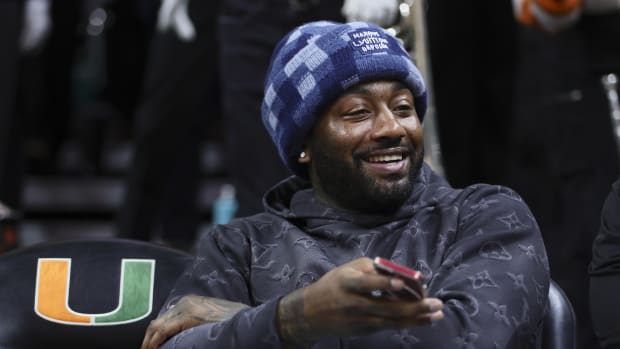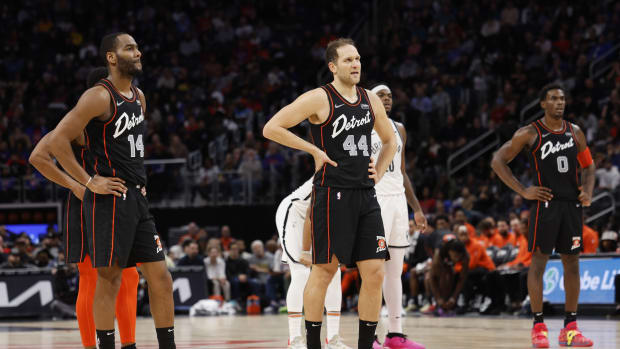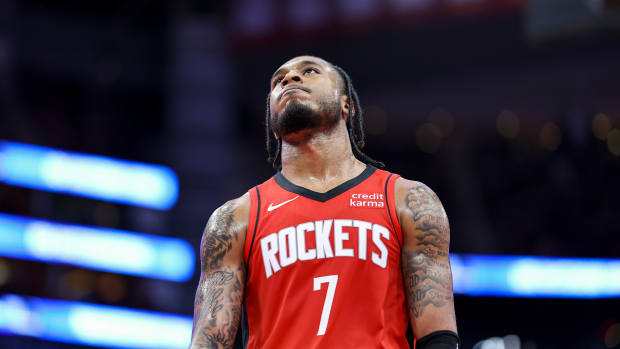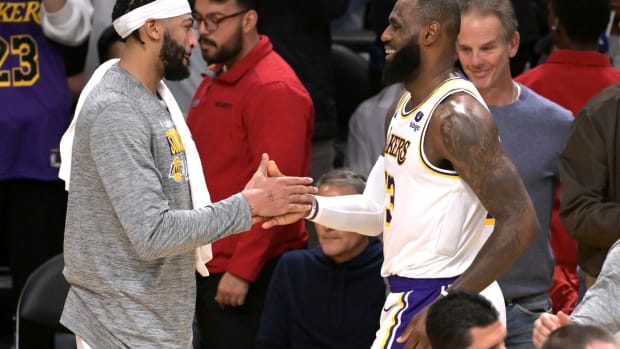NBA All-Decade Team: Debating Every Part of the List
This week Sports Illustrated released the All-Decade Team, focusing on players who have defined the last 10 years of the NBA. The Crossover's experts all pitched in and voted to make the project come to fruiton. And while this was a large, collaborative effort, not everyone can agree on everything. With that in mind, we put together a space to embrace debate. Below, writers whose selections came into direct conflict explain their thinking on players and their rightful place on the list.
All-Decade Coverage: Third Team | Second Team | First Team
Kevin Durant on the first team
The case for: I don’t even know how to argue this, it’s Kevin Durant! This is a no brainer! From 2010 through 2019, Durant was All-NBA every season, including six first-team selections. He won four scoring titles. He won an MVP. He won two championships. And he was the Finals MVP in both of them. He was an All-Star in every year of the 2010s. He was No. 2 on SI’s Top 100 list every year since its inception until this year, when he was left off due to injury.
Durant is probably the next most obvious choice to be First Team All-Decade after LeBron. He is going to go down as one of the greatest forwards in NBA history. Most other players in this decade simply don’t measure up to KD. The volume of his success in combination with the heights he’s reached are matched by very few players ever let alone by his peers. Durant is an obvious First Team All-Decade selection, and I can say that with supreme confidence. — Rohan Nadkarni
The case against: Maybe I’ve just spent too much time in Dallas over the last few years, or perhaps I have the image of a 40-year-old busting his ass after practice to try and get back onto the court for one final ride, but to me it seems obvious Dirk Nowitzki should be on the first-team of this past decade. Not only did he lead two, less-than-star-studded Mavericks iterations to the Finals, but he almost singe-handedly slayed LeBron James and the Miami Heat in 2011 to secure his vaunted championship.
Dallas never advanced past the first round of the postseason after capturing that title, but its the way Nowitzki revolutionized basketball that, to me, makes the man a surefire first-team selection. His collaboration with Avery Johnson to make the Mavericks’ offense orbit him at the nail was the first step toward truly shifting NBA basketball to the perimeter-centric style we enjoy today. And his stretchy shooting opened the door for unicorns like Kevin Durant and Giannis Antetokounmpo and Joel Embiid et al to redefine what we think 7-footers can do on the court. This selection is far more of an impact choice, that a statistical argument. Being that, I’m not sure coaches would have even encouraged Durant to shimmy and shake on the perimeter if Nowitzki had ushered in that possibility all the way back in the early 2000s…. only to continue dominating up until injuries really took their toll. — Jake Fischer
Where should Chris Paul rank?
The case for: I’ll keep this responsibly brief and I’ll be honest up front. CP3 made the first team for me because I’m convinced that he’s been criminally underrated for the majority of his career. It’s never made sense and it’s only gotten worse as his game declines and people try to pretend that Paul has always been fool’s gold. So if that reality where we’re headed, my All-Decade ballot was a protest vote. Put CP3 on the first team. He’s been outstanding for basically the entire decade, even going all the way back to the 2010 playoffs with the Hornets. The guy was a maniac. Unbelievable passer, the best shooter at point guard outside Steph, ruthless, efficient. He’s a better choice than James Harden for that second guard spot next to Curry. They both have sketchy postseason histories and they both have unimpeachable regular season track records with enormous value on offense; the difference is that for the vast majority of the decade, Paul was as elite on defense as he was on offense. I’m always been convinced that Paul’s career would look every bit as good (and maybe better) if he’d landed with a different team. Harden, I’m not so sure. That was the tiebreaker to me. Or at least, that’s how I justified my protest vote. — Andrew Sharp
The case against: The better part of Chris Paul’s career makes for a compelling Rorschach test. In terms of sustained statistical dominance, you can put his résumé up against just about any guard in recent memory. Very few point guards possess his type of playmaking brain, and his production in terms of points, assists and steals (and limited turnovers) inarguably makes him one of this generation’s best. Yet Paul has been to the conference finals just once in 14 seasons, on a Rockets team anchored by the younger and more impactful James Harden. More vitally, he spent the better part of the decade as a true ball-handling fulcrum for Clippers teams that won 50 games five times, but made as many first-round exits as they won playoff series (three). Deciding where to place Paul canonically depends largely on what you value. I realize only so many teams can play deep into the playoffs each year, but the fact that none of Paul’s Clipper teams ever left much of a dent is both baffling and concerning, to the point where I chose to reward players who had won more when it counted.
Some of this is circumstance: the Clippers were pitted against memorable Spurs, Grizzlies and Thunder teams in consecutive postseasons from 2012-2014. Injury misfortune hampered Paul’s opportunity to close series in the two years that followed, leading to two more Clippers exits. By the end of his tenure in L.A., his grating style and personality became part of a situation that left everyone involved worn down. The Rockets might have toppled the Warriors if not for his untimely postseason injury two years ago. Paul is another great for whom it’s easy to play the what-if game, and it can be spun both ways. But I cast my votes placing emphasis on concrete, sustained playoff success, and for varying reasons, Paul continually drew the short end of the stick. He’s a Hall of Fame player, but how well he truly stacks up historically in these types of conversations does leave room for some debate. — Jeremy Woo
Did Tim Duncan do enough?
The case for: Duncan’s prime was in the early aughts, when he won MVP's, Finals MVP’s and firmly established himself as the best center, er, power forward in basketball. Yet while his numbers were more pedestrian after 2010, his contributions were enormous. He racked up three All-Star bids, remained one of the NBA’s best defensive centers and—wait for it—contributed to winning. Duncan’s selflessness in taking a backseat to Tony Parker early in the decade allowed the Spurs to keep winning. His willingness to take a back, back seat to Parker and Kawhi Leonard allowed the Spurs to squeeze out one more championship. You can show me bigs with better numbers. You can’t show me many, maybe any, who impacted winning more, on the court and off. And isn’t that what it’s all about? — Chris Mannix
The case against: We’re not really debating Tim Duncan, but the last seven years of his career—his seven “worst” by most objective measures. Of course Duncan was still great. He just didn’t have the workload, responsibility, or volume of other stars during this decade, many of whom kept playing for years after his retirement. We have only nine frontcourt spots for these All-Decade teams. But there were 12 other frontcourt players with at least as many All-NBA appearances in the 2010s as Duncan, all of whom played—and produced—more than he did. If we want to prioritize peak performance, then there were also nine frontcourt players who received MVP votes this decade, where Duncan received none. If it’s the rings that matter, then there are nine other viable frontcourt candidates to consider along with Duncan.
The crunch is real. Three players (LeBron James, Kevin Durant, and Kawhi Leonard) are effectively frontcourt locks, leaving just six spots up for grabs among as many as 12 deserving candidates left on the board. Getting to Duncan, who has played hundreds of games and thousands of minutes fewer than most of them, feels like a bridge too far. — Rob Mahoney
The battle for Carmelo Anthony's legacy
The case for: The Melo hate has to calm down.
The last two years of his Hall of Fame career were a bit ugly and I get how that can leave a bad taste in some people’s mouth.
But over the last decade, Melo was clearly one of the best players in the league and his resume sets him apart from a good chunk of the crowd. His eight All-Star appearances are more than any player during those 10 years besides LeBron (10), Durant (10) and Westbrook (eight).
He is also one of only five players to win a scoring title during the decade. And although there are some younger players like Paul George and Giannis Antetokounmpo who were able to reach higher highs than Melo during this time, there is something to be said about being an All-Star in eight seasons versus six or three. His three All-NBA seasons don’t set him apart from the rest, but they do put him in the mix with a handful of players in a way that should allow his legacy throughout the last 10 years to have some meaning.
The Knicks turned to trash during the end of Melo’s time there and that has made it easier for many to match that to the moment when he fell off. His 2013-14 season gets completely forgotten because the rest of the team around him turned to shambles. But when it comes to individual play throughout the entire decade, including during New York’s demise, Melo had a career that is comparable to any forwards not named LeBron, Durant or Kawhi. In a pool of Blake Griffin, PG, Giannis and Anthony Davis, it’s understandable to not place peak Melo as high as the others. But when you look at the totality of what he did during the decade, and you don’t just focus on the top three or four years, you can see Melo deserves a spot on the second team. — Khadrice Rollins
The case against: Carmelo Anthony’s career got off to a sterling start. He stood side by side with LeBron James as he entered the league, took over his own team in Denver and immediately became one of the top young talents around. That trajectory remained in place for years with the Nuggets, as Anthony fought to emerge from the fray in the tough Western Conference. That is until that fateful day when he decided to demand a trade that would change everything in Denver and deplete the New York team he desperately wanted to join.
In that moment, Anthony’s career turned in a different direction. He still piled on the points and the Knicks remained respectable for a few years, but when the bottom fell out there was no closing the chasm between Anthony and modern day stars. The decision was a sign that decision-making would be what drowned Anthony. An unwillingness to adopt fit that bill and stood at the heart of the problem, as the Knicks’ franchise cornerstone refused to transition when the style of play changed. Anthony never fully trusted the players around him and the Knicks never fully committed to playing winning basketball. Anthony’s ability to score was unimpeachable. He was a walking bucket deep into his career, but as the years wore on it became clearer that was all he planned to offer. The legacy Anthony created should be respected more than it is in 2019, but it also needs to be placed in proper perspective. — DeAntae Prince




































